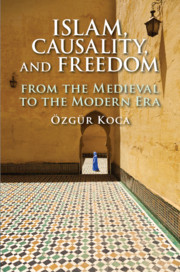'This ambitious book covers a broad chronological and disciplinary range. It deftly analyses two intertwined and seemingly irreconcilable problems in the Islamic philosophical and theological traditions - human free will and restrictions on causal operations within a divinely-created world. Dr. Koca's monograph is an impressive addition to the growing body of scholarship in the Islamic rationalist disciplines.'
Asad Q. Ahmed - University of California, Berkeley
'This learned and perspicacious book is one of the most important studies on Islamic theology and philosophy to be published in the last decade. Focusing on some of the key medieval and modern Muslim scholars, the author analyzes occasionalist and participatory accounts of causality and freedom in rationalist, orthodox, and Sufi Islamic thought. Notably, among the most enlightening contributions of this book is its discussion on contemporary discourses on religion and science in relation to Islamic theories of causality. Certainly this book is of great interest to all students of religion and philosophy, but it is mandatory reading for any serious scholar of Islamic thought.'
Dr. Khaled Abou El Fadl - Omar and Azmeralda Alfi Distinguished Professor of Law, University of California, Los Angeles
'Ozgur Koca has produced a magisterial work, the kind of volume one expects from great scholars at the pinnacle of their careers. The breadth and depth of scholarship is remarkable, yet difficult concepts are presented clearly enough that the book can be used as an introductory text to the field. Koca treats the pivotal figures in Islamic philosophy and theology with fairness and respect, working to bring the strengths of each to the surface. His greatest achievement, however, is to offer an Islamic theory of causation that is adequate both to the demands of contemporary science and to the actuality of human free will.'
Philip Clayton - Ingraham Professor, Claremont School of Theology
‘Koca’s book is a serious and thorough study of the subject as reflected in the writings of the most important figures of the Islamic Intellectual tradition. It is a notable addition to the literature in this field and worthy of receiving wide attention.’
Seyyed Hossein Nasr - Professor Emeritus of Islamic Studies, George Washington University
‘This is a tour de force of key thinkers in the Muslim tradition on questions that continue to animate contemporary Muslim philosophical and theological debates. Scholarly, yet clearly written, Koca’s book will help all readers get a better idea of the complexity and history of Muslim philosophical debates. Koca’s dedication is to be commended.’
Ebrahim Moosa - Mirza Family Chair in Islamic Thought and Muslim Societies, Keough School of Global Affairs, University of Notre Dame
‘Islam, Causality, and Freedom covers and critically discusses with clarity and lucidity an impressive amount of contributions to the philosophico-theological discussion over causality and divine action that the reader would otherwise find scattered in various texts written in different languages. This is a precious tool for anyone interested in the reconstruction of a debate of immense importance in the history of Islamic thought as well as in its comparison with analogous discussions in the Western/non-Muslim world.’
Stefano Bigliardi - Assistant Professor of Philosophy, AUI - Al Akhawayn University in Infrane, Morocco
‘This volume is a remarkable new survey of the dual themes of causality and human freedom in Islamic intellectual history which are still relevant and important in contemporary philosophical thought … This volume is thus essential reading, not only for scholars with an interest in the literature in this field but also for anyone interested in how Islamic traditions relate to contemporary Muslim philosophical and theological debates.’
Seyyed Khalil Toussi
Source: Sophia



